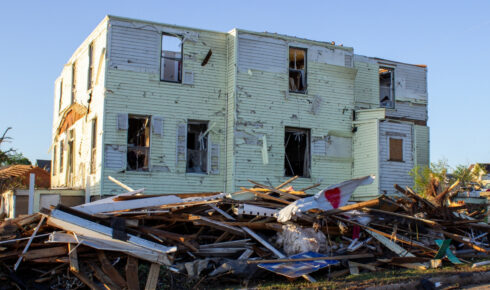It is by nature and perhaps God’s purpose that chaplains interface with clergy of other faiths during tragedies. I learned some valuable lessons in that area on Friday, September 12, 2008, when I responded to a call from the Mayor’s Crisis Response Team (CRT) and worked all night at the “Reunification Center,” ministering to the families of the 25 people killed in the Metrolink train crash in Chatsworth, CA.
The CRT is a secular program that requires its volunteer members to undergo 48 hours of training. Members are called out to work with first responders at crime scenes, suicides, accidents and, in some cases, natural deaths. That Friday, I was dispatched to the Chatsworth High School and arrived about 6:15 p.m., only two hours after the accident, with orders to help the Los Angeles Police Department set up a Critical Incident Command Center.
Mass causality scenes are, by nature, fluid and information and communication is never perfect. The high school was to be a “Unification Center” where family members could be unified. We first collected information on victims’ family members gathered there and the persons they were waiting for. Hospitals were faxing in their admissions and we were alerting matching family members who then left for the 12 hospitals treating incident patients.
The Red Cross quickly set up a shelter using food and drinks donated by local merchants. Volunteers flooded the site. Several groups of youth had come to volunteer and pray. I spoke with several of them to encourage their prayers and share other with them.
The CRT members began talking to the families waiting to hear the status of their loved ones. We received training in debriefing we attempted to get family members to express their emotions, knowing that it was perfectly normal for them to be angry, frustrated or even hysterical.
It became apparent that many of the families would never again see their loved ones alive, yet so many clung to hope. I approached an Asian lady who was crying and being comforted by a worker from the Buddhist Compassion group. I told them I was a chaplain and the Buddhist worker explained that the woman crying had a son in the crash and was a Christian. However, she spoke only Chinese. Without hesitating the Buddhist asked the Christian victim in Chinese if she wanted prayer. When she said yes, I prayed a Christian prayer that was kindly translated into Chinese.
The causality list of those hospitalized grew by the hour, but many names connected to the families there were sadly not on it. We reminded them that sometimes no news is good news and that their loved ones could be on the way or still in hospital waiting rooms, waiting to be processed.
Los Angeles Sheriff Lee Baca formally addressed the victims’ family members and later the group gathered in the school’s assembly hall as Mayor Antonio Villaraigosa and others gave all the available information they had. The mayor stayed longer to field some very tough questions.
The Red Cross had set up cots for family members who wished to spend the night with the hope of receiving the latest word on the fate of those they loved. An L.A Coroner arrived just after 3:00 a.m. Being a chaplain, I was asked to be part of the support team when she delivered death notifications.
Other CRT members, all with extreme kindness, ushered the victims’ family members into the school’s band room where a coroner office representative quietly informed them that their loved ones were dead. Among the support team was a Jewish Rabbi and a well-educated Los Angeles Mental Health worker.
The pain and anguish was something I will never forget. In such circumstances, words of comfort, while readily available and easily heartfelt, sometimes fall short. In the privacy of intense grief, especially if another loved one is present to provide comfort, our words were not always appropriate or welcome.
Yet I have learned two things: simply being there means a great deal to the victim and silent prayer is not only fitting, but has the power to bring peace and comfort, often beyond mere words spoken.
At the time, a spiritual peace descended upon me. While permitting me to show genuine compassion, it protected my heart and mind from the anguish that filled that room for several hours. I didn’t realize it until I was home the next afternoon, that in the span of a few hours, I had taken part in at least six death notifications.
Before one notification, I learned the family was Buddhist and realized that the Buddhist Mental Health worker had left. He had given me his card and when I called, he readily came back to minister to the family.
My last notification came after 6:00 a.m. when we informed a Spanish-speaking couple that their daughter had been killed. They were devout Catholics and wanted spiritual comfort. I recited verses from the Bible as another family member interpreted. Despite the language difference, the Holy Spirit interceded and a peace came over the scene that certainly surpassed my understanding.
Yet a Spanish-speaking priest was needed. After my unsuccessful call to the family’s church, the Rabbi produced a list of Spanish priests. We were able to make contact and a police car was immediately dispatched. After I prayed and recited verses for close to 45 minutes, the priest arrived and spoke words of comfort in the family’s native language. I quietly slipped away. A Jewish rabbi helping a Protestant chaplain find a Spanish speaking Catholic priest in any other venue would be fodder for a joke. Here, it contained a meaning that will live forever in my heart.
At about 7:30 a.m., at least 13 hours after I arrived, I told my superior I had hit the wall. I drove home with wet eyes, doing my best to remember what God’s word said about hope. At home I found Colossians 1:27: “To them God willed to make known what are the riches of His glory of this mystery among the Gentiles, which is Christ in you, the hope of glory.”
I left the scene with three things burning in my heart:
- Isaiah was right. Life is no more permanent than a blade of grass. It’s doubtful that any person who boarded that train that afternoon had any thought that they would not arrive safely.
- I felt a new urgency to spread the hope of Christ in us, the true hope of glory, and the sole hope that transcends the grave.
- Just like the Good Samaritan who didn’t mention God to those he helped, I realized that becoming Christ’s love in action sometimes means ministering in unity with persons of other faiths and, in many instances, not speaking at all.
Churches and Christians will always play a roll in assisting victims of disasters. Many came to the Chatsworth High School command center to help, and their prayers did help. But sadly, unless one is a trained member of an organization called upon to help by official first responders, you are just another civilian standing around, and viewed by many as “in the way.”
In some ways, the recent “minor” earthquake so many of us felt in the Los Angeles area was a wake-up call. A tremendous amount of resources were required to properly respond to a disaster as large as the Metrolink crash. How much more will be needed when the predicted and prophesied “big one” hits Los Angeles?
I would like to encourage dedicated Christians and especially Foursquare ministers and chaplains to become members of the Mayor’s Crisis Response Team by contacting Jeff Zimmerman by e-mail or calling him at 213.978.0697. I also suggest you join me in becoming a member of Christian Victim Relief Ministries (VRM). VRM is a national organization of Christian Chaplains who respond to disasters all over the country. I served as a VRM Chaplain at a Red Cross center in San Diego during last fall’s wildfires and was allowed to hold a Sunday church service at the shelter. A VRM training is set for Nov. 21-22 in Hawthorne, CA. Information is available by calling Mike Nelson at 562.270.2219, or by going to victimreliefsocal.org. You may also contact me, Chaplain Ed Donnally, at 310.419.1687.


